Teleological Argument: A Discourse on Validating the Existence of God
VerifiedAdded on 2023/05/31
|6
|1525
|215
Essay
AI Summary
This essay delves into the teleological argument, also known as the physico-theological argument or the argument from design, to validate the existence of God. It traces the argument's origins from Socrates, Plato, and Aristotle, through its adoption by Abrahamic religions and Islamic philosophers like Al-Ghazali, to its critique by figures like David Hume and Charles Darwin. The essay examines key scriptures from Christianity, Judaism, and Islam to demonstrate a common belief in God as the ultimate creator. It discusses Aquinas' argument regarding the necessity of a supreme designer, Paley's watchmaker analogy, and contemporary versions of the argument based on biochemical complexity and biological information, ultimately concluding that the existence of God is factual based on these explanations and scriptural references. Desklib provides access to similar essays and study resources for students.
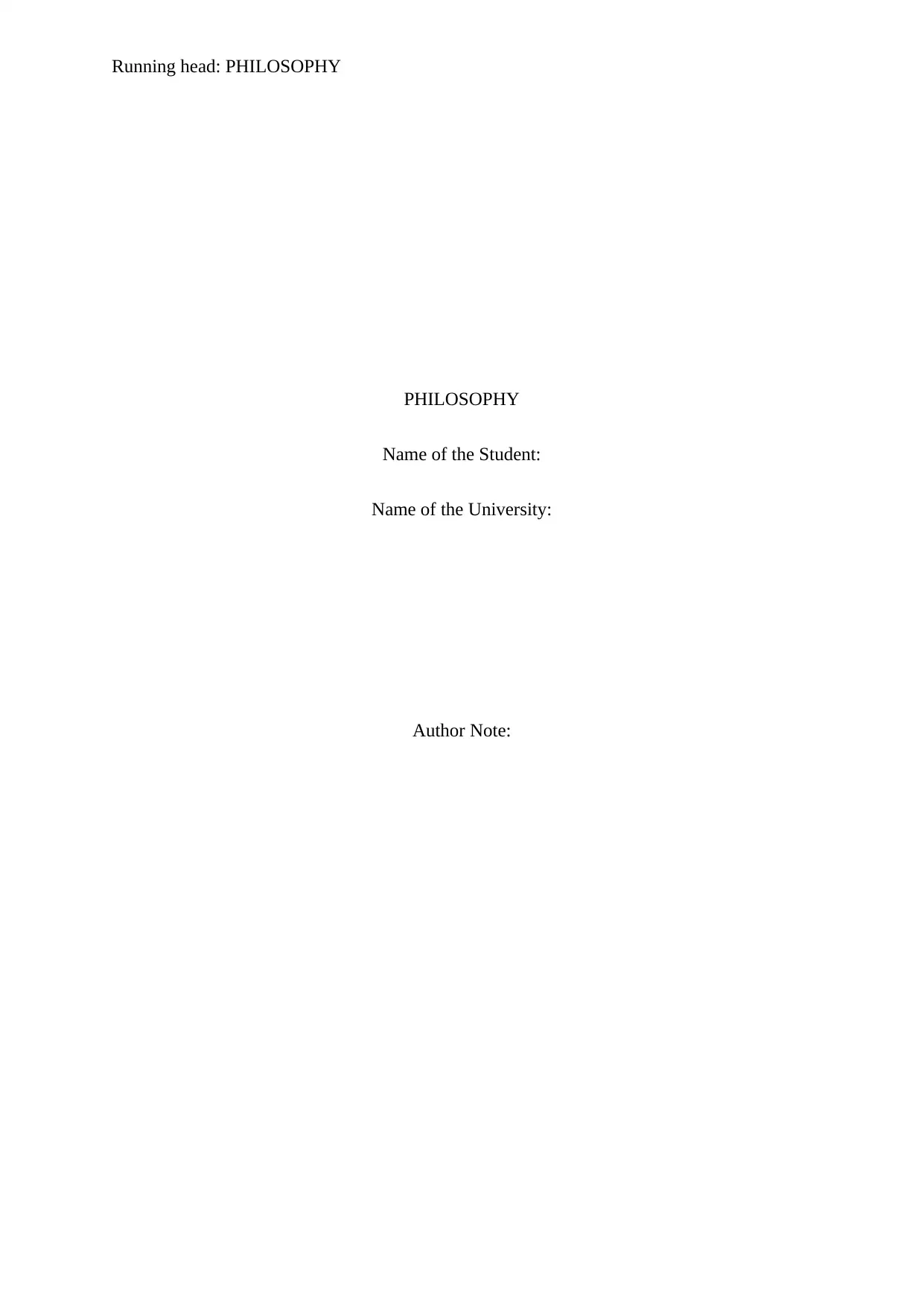
Running head: PHILOSOPHY
PHILOSOPHY
Name of the Student:
Name of the University:
Author Note:
PHILOSOPHY
Name of the Student:
Name of the University:
Author Note:
Paraphrase This Document
Need a fresh take? Get an instant paraphrase of this document with our AI Paraphraser
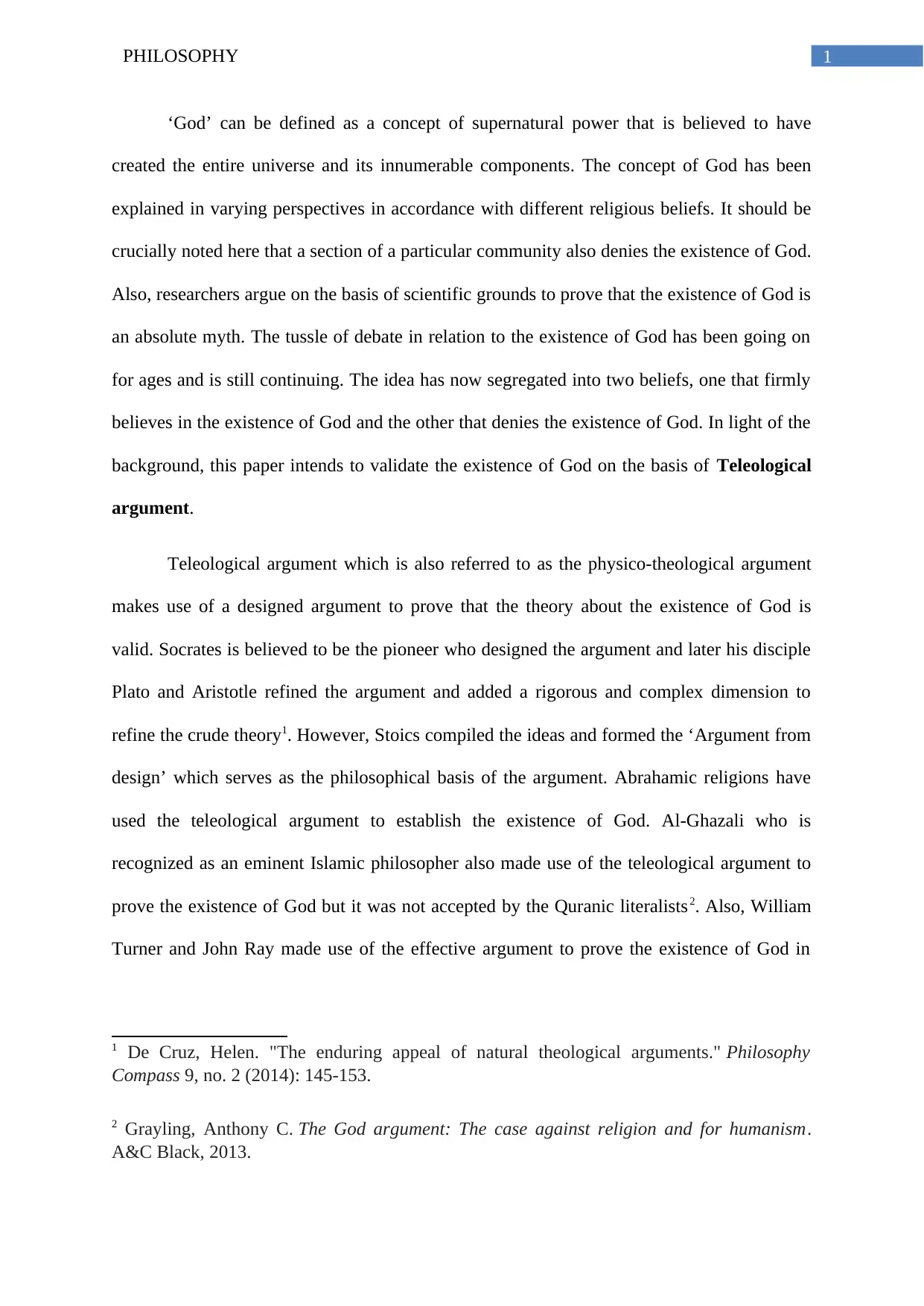
1PHILOSOPHY
‘God’ can be defined as a concept of supernatural power that is believed to have
created the entire universe and its innumerable components. The concept of God has been
explained in varying perspectives in accordance with different religious beliefs. It should be
crucially noted here that a section of a particular community also denies the existence of God.
Also, researchers argue on the basis of scientific grounds to prove that the existence of God is
an absolute myth. The tussle of debate in relation to the existence of God has been going on
for ages and is still continuing. The idea has now segregated into two beliefs, one that firmly
believes in the existence of God and the other that denies the existence of God. In light of the
background, this paper intends to validate the existence of God on the basis of Teleological
argument.
Teleological argument which is also referred to as the physico-theological argument
makes use of a designed argument to prove that the theory about the existence of God is
valid. Socrates is believed to be the pioneer who designed the argument and later his disciple
Plato and Aristotle refined the argument and added a rigorous and complex dimension to
refine the crude theory1. However, Stoics compiled the ideas and formed the ‘Argument from
design’ which serves as the philosophical basis of the argument. Abrahamic religions have
used the teleological argument to establish the existence of God. Al-Ghazali who is
recognized as an eminent Islamic philosopher also made use of the teleological argument to
prove the existence of God but it was not accepted by the Quranic literalists2. Also, William
Turner and John Ray made use of the effective argument to prove the existence of God in
1 De Cruz, Helen. "The enduring appeal of natural theological arguments." Philosophy
Compass 9, no. 2 (2014): 145-153.
2 Grayling, Anthony C. The God argument: The case against religion and for humanism.
A&C Black, 2013.
‘God’ can be defined as a concept of supernatural power that is believed to have
created the entire universe and its innumerable components. The concept of God has been
explained in varying perspectives in accordance with different religious beliefs. It should be
crucially noted here that a section of a particular community also denies the existence of God.
Also, researchers argue on the basis of scientific grounds to prove that the existence of God is
an absolute myth. The tussle of debate in relation to the existence of God has been going on
for ages and is still continuing. The idea has now segregated into two beliefs, one that firmly
believes in the existence of God and the other that denies the existence of God. In light of the
background, this paper intends to validate the existence of God on the basis of Teleological
argument.
Teleological argument which is also referred to as the physico-theological argument
makes use of a designed argument to prove that the theory about the existence of God is
valid. Socrates is believed to be the pioneer who designed the argument and later his disciple
Plato and Aristotle refined the argument and added a rigorous and complex dimension to
refine the crude theory1. However, Stoics compiled the ideas and formed the ‘Argument from
design’ which serves as the philosophical basis of the argument. Abrahamic religions have
used the teleological argument to establish the existence of God. Al-Ghazali who is
recognized as an eminent Islamic philosopher also made use of the teleological argument to
prove the existence of God but it was not accepted by the Quranic literalists2. Also, William
Turner and John Ray made use of the effective argument to prove the existence of God in
1 De Cruz, Helen. "The enduring appeal of natural theological arguments." Philosophy
Compass 9, no. 2 (2014): 145-153.
2 Grayling, Anthony C. The God argument: The case against religion and for humanism.
A&C Black, 2013.
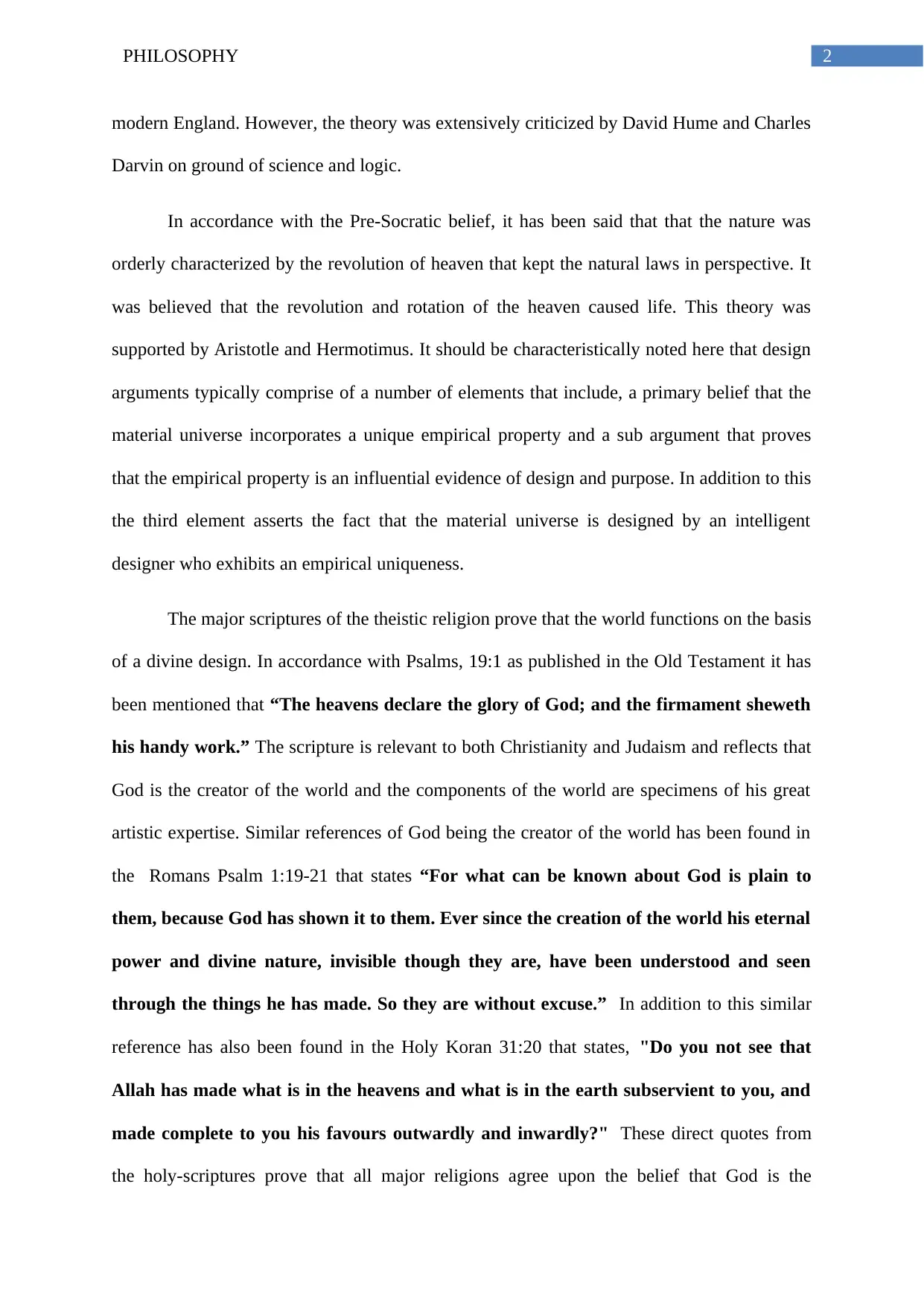
2PHILOSOPHY
modern England. However, the theory was extensively criticized by David Hume and Charles
Darvin on ground of science and logic.
In accordance with the Pre-Socratic belief, it has been said that that the nature was
orderly characterized by the revolution of heaven that kept the natural laws in perspective. It
was believed that the revolution and rotation of the heaven caused life. This theory was
supported by Aristotle and Hermotimus. It should be characteristically noted here that design
arguments typically comprise of a number of elements that include, a primary belief that the
material universe incorporates a unique empirical property and a sub argument that proves
that the empirical property is an influential evidence of design and purpose. In addition to this
the third element asserts the fact that the material universe is designed by an intelligent
designer who exhibits an empirical uniqueness.
The major scriptures of the theistic religion prove that the world functions on the basis
of a divine design. In accordance with Psalms, 19:1 as published in the Old Testament it has
been mentioned that “The heavens declare the glory of God; and the firmament sheweth
his handy work.” The scripture is relevant to both Christianity and Judaism and reflects that
God is the creator of the world and the components of the world are specimens of his great
artistic expertise. Similar references of God being the creator of the world has been found in
the Romans Psalm 1:19-21 that states “For what can be known about God is plain to
them, because God has shown it to them. Ever since the creation of the world his eternal
power and divine nature, invisible though they are, have been understood and seen
through the things he has made. So they are without excuse.” In addition to this similar
reference has also been found in the Holy Koran 31:20 that states, "Do you not see that
Allah has made what is in the heavens and what is in the earth subservient to you, and
made complete to you his favours outwardly and inwardly?" These direct quotes from
the holy-scriptures prove that all major religions agree upon the belief that God is the
modern England. However, the theory was extensively criticized by David Hume and Charles
Darvin on ground of science and logic.
In accordance with the Pre-Socratic belief, it has been said that that the nature was
orderly characterized by the revolution of heaven that kept the natural laws in perspective. It
was believed that the revolution and rotation of the heaven caused life. This theory was
supported by Aristotle and Hermotimus. It should be characteristically noted here that design
arguments typically comprise of a number of elements that include, a primary belief that the
material universe incorporates a unique empirical property and a sub argument that proves
that the empirical property is an influential evidence of design and purpose. In addition to this
the third element asserts the fact that the material universe is designed by an intelligent
designer who exhibits an empirical uniqueness.
The major scriptures of the theistic religion prove that the world functions on the basis
of a divine design. In accordance with Psalms, 19:1 as published in the Old Testament it has
been mentioned that “The heavens declare the glory of God; and the firmament sheweth
his handy work.” The scripture is relevant to both Christianity and Judaism and reflects that
God is the creator of the world and the components of the world are specimens of his great
artistic expertise. Similar references of God being the creator of the world has been found in
the Romans Psalm 1:19-21 that states “For what can be known about God is plain to
them, because God has shown it to them. Ever since the creation of the world his eternal
power and divine nature, invisible though they are, have been understood and seen
through the things he has made. So they are without excuse.” In addition to this similar
reference has also been found in the Holy Koran 31:20 that states, "Do you not see that
Allah has made what is in the heavens and what is in the earth subservient to you, and
made complete to you his favours outwardly and inwardly?" These direct quotes from
the holy-scriptures prove that all major religions agree upon the belief that God is the
⊘ This is a preview!⊘
Do you want full access?
Subscribe today to unlock all pages.

Trusted by 1+ million students worldwide
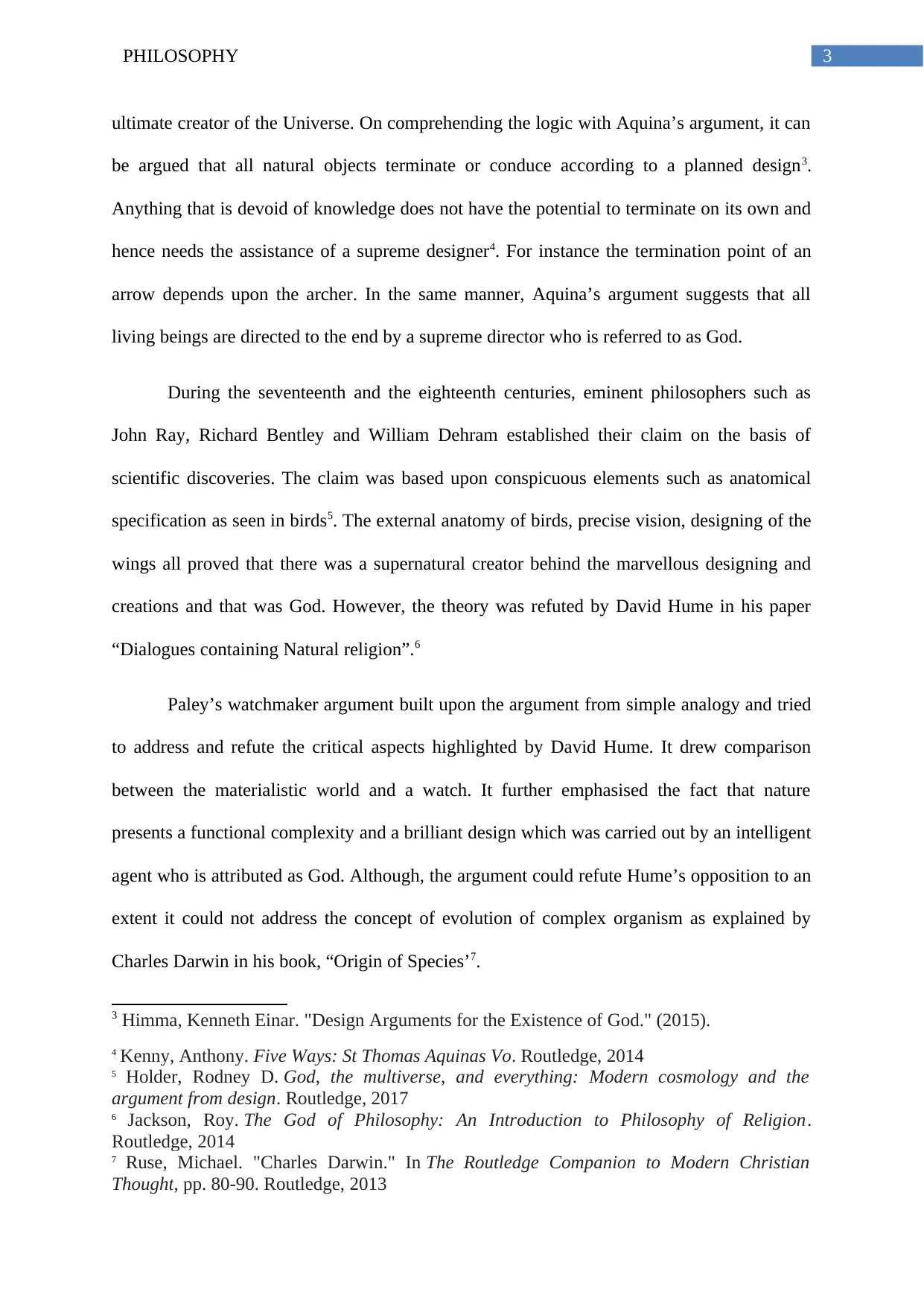
3PHILOSOPHY
ultimate creator of the Universe. On comprehending the logic with Aquina’s argument, it can
be argued that all natural objects terminate or conduce according to a planned design3.
Anything that is devoid of knowledge does not have the potential to terminate on its own and
hence needs the assistance of a supreme designer4. For instance the termination point of an
arrow depends upon the archer. In the same manner, Aquina’s argument suggests that all
living beings are directed to the end by a supreme director who is referred to as God.
During the seventeenth and the eighteenth centuries, eminent philosophers such as
John Ray, Richard Bentley and William Dehram established their claim on the basis of
scientific discoveries. The claim was based upon conspicuous elements such as anatomical
specification as seen in birds5. The external anatomy of birds, precise vision, designing of the
wings all proved that there was a supernatural creator behind the marvellous designing and
creations and that was God. However, the theory was refuted by David Hume in his paper
“Dialogues containing Natural religion”.6
Paley’s watchmaker argument built upon the argument from simple analogy and tried
to address and refute the critical aspects highlighted by David Hume. It drew comparison
between the materialistic world and a watch. It further emphasised the fact that nature
presents a functional complexity and a brilliant design which was carried out by an intelligent
agent who is attributed as God. Although, the argument could refute Hume’s opposition to an
extent it could not address the concept of evolution of complex organism as explained by
Charles Darwin in his book, “Origin of Species’7.
3 Himma, Kenneth Einar. "Design Arguments for the Existence of God." (2015).
4 Kenny, Anthony. Five Ways: St Thomas Aquinas Vo. Routledge, 2014
5 Holder, Rodney D. God, the multiverse, and everything: Modern cosmology and the
argument from design. Routledge, 2017
6 Jackson, Roy. The God of Philosophy: An Introduction to Philosophy of Religion.
Routledge, 2014
7 Ruse, Michael. "Charles Darwin." In The Routledge Companion to Modern Christian
Thought, pp. 80-90. Routledge, 2013
ultimate creator of the Universe. On comprehending the logic with Aquina’s argument, it can
be argued that all natural objects terminate or conduce according to a planned design3.
Anything that is devoid of knowledge does not have the potential to terminate on its own and
hence needs the assistance of a supreme designer4. For instance the termination point of an
arrow depends upon the archer. In the same manner, Aquina’s argument suggests that all
living beings are directed to the end by a supreme director who is referred to as God.
During the seventeenth and the eighteenth centuries, eminent philosophers such as
John Ray, Richard Bentley and William Dehram established their claim on the basis of
scientific discoveries. The claim was based upon conspicuous elements such as anatomical
specification as seen in birds5. The external anatomy of birds, precise vision, designing of the
wings all proved that there was a supernatural creator behind the marvellous designing and
creations and that was God. However, the theory was refuted by David Hume in his paper
“Dialogues containing Natural religion”.6
Paley’s watchmaker argument built upon the argument from simple analogy and tried
to address and refute the critical aspects highlighted by David Hume. It drew comparison
between the materialistic world and a watch. It further emphasised the fact that nature
presents a functional complexity and a brilliant design which was carried out by an intelligent
agent who is attributed as God. Although, the argument could refute Hume’s opposition to an
extent it could not address the concept of evolution of complex organism as explained by
Charles Darwin in his book, “Origin of Species’7.
3 Himma, Kenneth Einar. "Design Arguments for the Existence of God." (2015).
4 Kenny, Anthony. Five Ways: St Thomas Aquinas Vo. Routledge, 2014
5 Holder, Rodney D. God, the multiverse, and everything: Modern cosmology and the
argument from design. Routledge, 2017
6 Jackson, Roy. The God of Philosophy: An Introduction to Philosophy of Religion.
Routledge, 2014
7 Ruse, Michael. "Charles Darwin." In The Routledge Companion to Modern Christian
Thought, pp. 80-90. Routledge, 2013
Paraphrase This Document
Need a fresh take? Get an instant paraphrase of this document with our AI Paraphraser
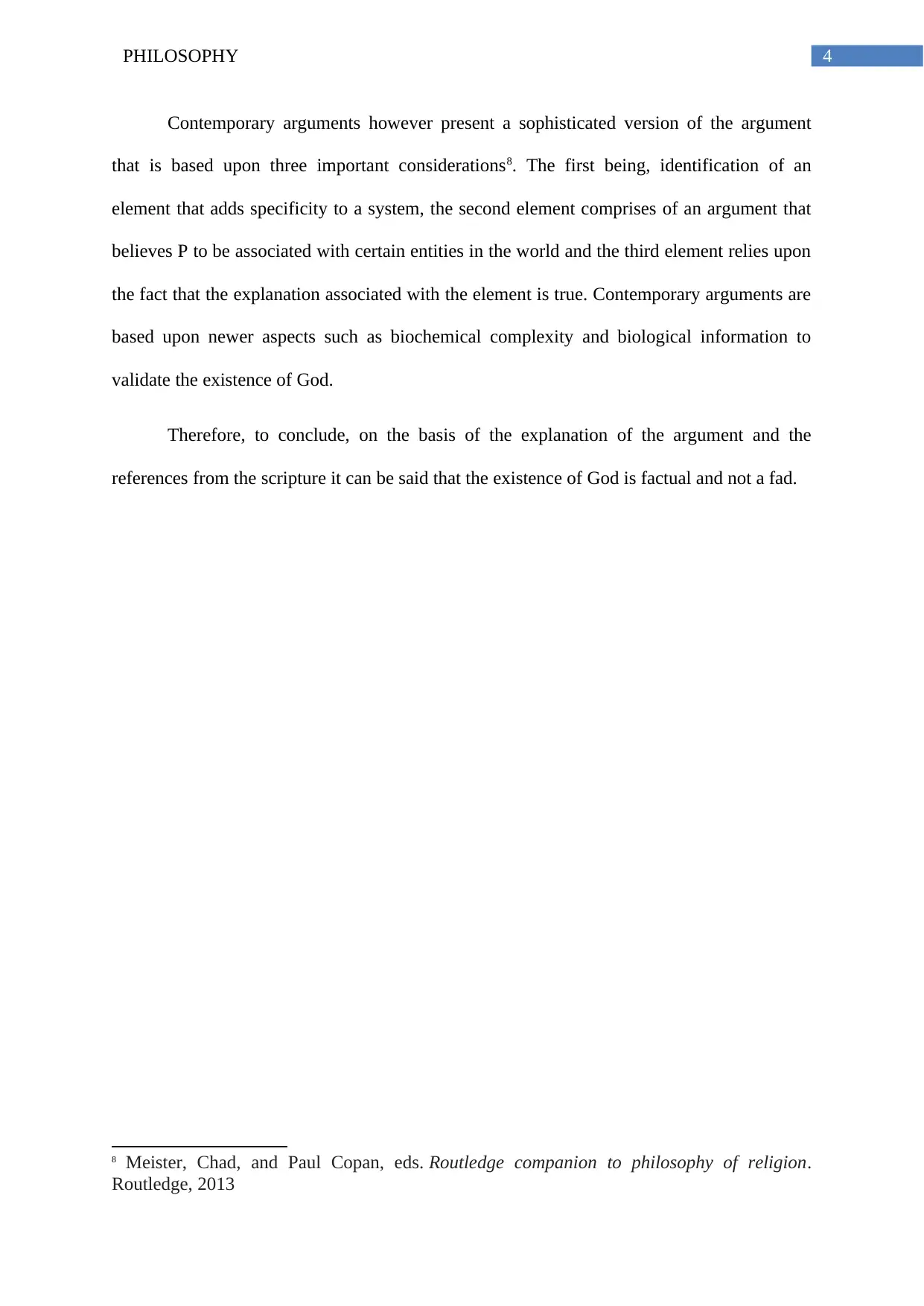
4PHILOSOPHY
Contemporary arguments however present a sophisticated version of the argument
that is based upon three important considerations8. The first being, identification of an
element that adds specificity to a system, the second element comprises of an argument that
believes P to be associated with certain entities in the world and the third element relies upon
the fact that the explanation associated with the element is true. Contemporary arguments are
based upon newer aspects such as biochemical complexity and biological information to
validate the existence of God.
Therefore, to conclude, on the basis of the explanation of the argument and the
references from the scripture it can be said that the existence of God is factual and not a fad.
8 Meister, Chad, and Paul Copan, eds. Routledge companion to philosophy of religion.
Routledge, 2013
Contemporary arguments however present a sophisticated version of the argument
that is based upon three important considerations8. The first being, identification of an
element that adds specificity to a system, the second element comprises of an argument that
believes P to be associated with certain entities in the world and the third element relies upon
the fact that the explanation associated with the element is true. Contemporary arguments are
based upon newer aspects such as biochemical complexity and biological information to
validate the existence of God.
Therefore, to conclude, on the basis of the explanation of the argument and the
references from the scripture it can be said that the existence of God is factual and not a fad.
8 Meister, Chad, and Paul Copan, eds. Routledge companion to philosophy of religion.
Routledge, 2013
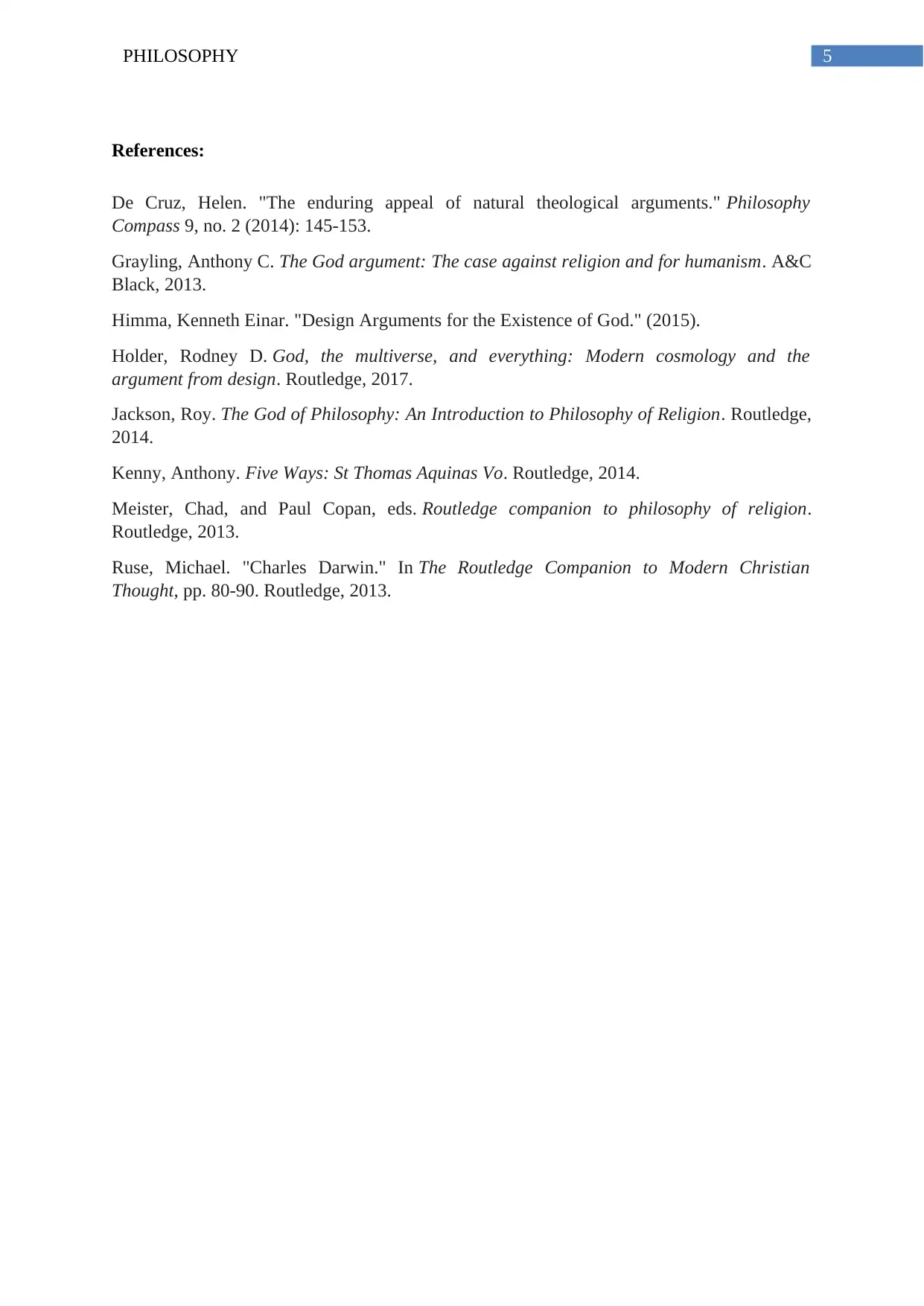
5PHILOSOPHY
References:
De Cruz, Helen. "The enduring appeal of natural theological arguments." Philosophy
Compass 9, no. 2 (2014): 145-153.
Grayling, Anthony C. The God argument: The case against religion and for humanism. A&C
Black, 2013.
Himma, Kenneth Einar. "Design Arguments for the Existence of God." (2015).
Holder, Rodney D. God, the multiverse, and everything: Modern cosmology and the
argument from design. Routledge, 2017.
Jackson, Roy. The God of Philosophy: An Introduction to Philosophy of Religion. Routledge,
2014.
Kenny, Anthony. Five Ways: St Thomas Aquinas Vo. Routledge, 2014.
Meister, Chad, and Paul Copan, eds. Routledge companion to philosophy of religion.
Routledge, 2013.
Ruse, Michael. "Charles Darwin." In The Routledge Companion to Modern Christian
Thought, pp. 80-90. Routledge, 2013.
References:
De Cruz, Helen. "The enduring appeal of natural theological arguments." Philosophy
Compass 9, no. 2 (2014): 145-153.
Grayling, Anthony C. The God argument: The case against religion and for humanism. A&C
Black, 2013.
Himma, Kenneth Einar. "Design Arguments for the Existence of God." (2015).
Holder, Rodney D. God, the multiverse, and everything: Modern cosmology and the
argument from design. Routledge, 2017.
Jackson, Roy. The God of Philosophy: An Introduction to Philosophy of Religion. Routledge,
2014.
Kenny, Anthony. Five Ways: St Thomas Aquinas Vo. Routledge, 2014.
Meister, Chad, and Paul Copan, eds. Routledge companion to philosophy of religion.
Routledge, 2013.
Ruse, Michael. "Charles Darwin." In The Routledge Companion to Modern Christian
Thought, pp. 80-90. Routledge, 2013.
⊘ This is a preview!⊘
Do you want full access?
Subscribe today to unlock all pages.

Trusted by 1+ million students worldwide
1 out of 6